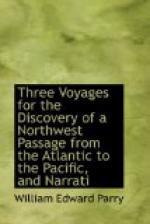Aug. 1.—The information obtained by Captain Lyon on his late journey with the Esquimaux served very strongly to confirm all that had before been understood from those people respecting the existence of the desired passage to the westward in this neighbourhood, though the impossibility of Captain Lyon’s proceeding farther in that direction, combined with our imperfect knowledge of the language, still left us in some doubt as to the exact position of the strait in question. While, therefore, Captain Lyon was acquainting me with his late proceedings, we shaped a course for Igloolik, in order to continue our look-out upon the ice, and made the tents very accurately by the compass, after a run of five leagues.
The present state of the ice, which was thin and “rotten,”, served no less to excite our surprise than to keep alive our hopes and expectations. The spaces occupied respectively by ice and holes were about equal; and so extensive and dangerous were the latter, that the men could with extreme difficulty walk twenty or thirty yards from the ship to place the anchors, and that at no small risk of falling through. We were astonished, therefore, to find with what tenacity a field of ice, whose parts appeared thus loosely joined, still continued to hang together, notwithstanding the action of the swell that almost constantly set upon its margin.
We had for several days past occasionally seen black whales about the ships, and our boats were kept in constant readiness to strike one, for the sake of the oil, in which endeavour they at length succeeded this morning. The usual signal being exhibited, all the boats were sent to their assistance, and in less than an hour and a half had killed and secured the fish, which proved a moderate-sized one of above “nine feet bone,” exactly suiting our purpose. The operation of “flinching” this animal, which was thirty-nine feet and a half in length, occupied most of the afternoon, each ship taking half the blubber and hauling it on the ice, “to make off” or put into casks.
As soon as we had completed the stowage of the blubber, and washed the ships and people’s clothes, we cast off on the 6th, taking in tow the carcass of the whale (technically called the “crang”) for our friends at Igloolik. The wind dying away when the ships were off the northeast end of the island, the boats were despatched to tow the whale on shore, while Captain Lyon and myself went ahead to meet some of the canoes that were paddling towards us. We soon joined eleven of them, and on our informing the Esquimaux of the prize the boats were bringing them, they paddled off with great delight. When they arrived at the spot, and had civilly asked permission to eat some of it, they dropped their canoes astern to the whale’s tail, from which they cut off enormous lumps of flesh and ravenously devoured it; after which they followed our boats in-shore, where the carcass was made fast to a mass of grounded ice for their future disposal.




